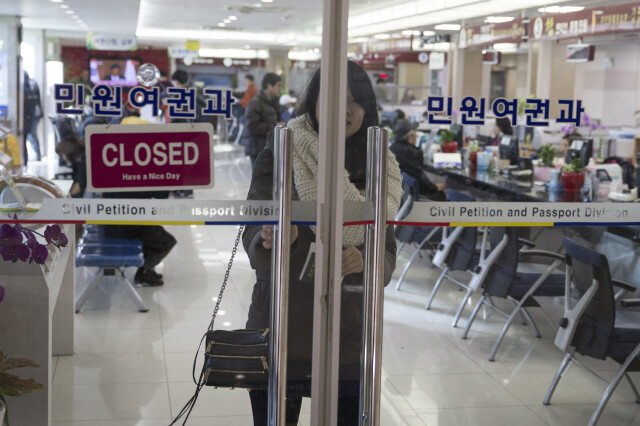hankyoreh
Links to other country sites 다른 나라 사이트 링크
Young people increasingly looking to escape Korea for a life abroad

Kim Min-a, 22, a junior at a university in Seoul, is already pursuing her dream of living in Germany in the not-so-distant future. This is not just a resolution, though - she has already laid concrete plans for making this a reality.
Non-Germans who are hired by Lufthansa receive permanent residency in the country after six years with the airline. After completing a two-year contract with Lufthansa and passing a German language test, employees can receive a permanent contract.
“They don’t hire South Koreans every year, but the next opportunity will probably come up about four years from now. I’m planning to complete my preparations for applying for a job by that time,” Kim said.
Kim was motivated to make her immigration plans for quite practical considerations. She concluded that, as long as she is in South Korea, she will have trouble not only living the way she wants as a woman, but also balancing her work and family.
Kim did consider dedicating herself to the quest of landing a job at one of South Korea’s big conglomerates. But even if she succeeded, she knew she would have to endure long hours of work and unending competition for promotions, a prospect that sickened her.
“When I was a sophomore in university, I took part in the Jung Ju Young Startup Competition and got as far as the finals, though I was eliminated right before the seed money was awarded. When I went for the interview, someone told me I should get my hair cut because it looked too long. I couldn’t believe it. I just felt that, no matter how much I want something, there’s nothing for me to do here,” Kim said.
There are young people all over the country who have already made their “South Korean escape,” at least in spirit, though they may not be ready to leave just yet. There are quite a few groups of people raising funds to immigrate or learning how immigration works.
On a website called Hell Korea (hellkorea.com), various individuals have posted tips about getting out of the country on the site’s “Escape Korea” message board. Some typical posts are “The Pros of American Citizenship” and “How to Immigrate to Canada as a Skilled Worker.”
One netizen who succeeded at immigrating to Canada as a skilled worker shared [his] experience. “I was working at a web agency, which is regarded as the absolute worst place to be in the IT industry. You wouldn’t believe the exhaustion I was dealing with because of my long working hours. I decided to get a work visa as a welder in Canada, because of the educational and medical benefits there, and I spent about six years being trained and gaining experience,” [he] wrote.
Kim set up a German study group to prepare for getting a job. Using Spec Up and other websites, she found some people to study with her.
“When I asked them why they wanted to study German, the majority of them told me that they were getting ready to escape Korea. Some people wanted to study abroad in Germany, and others were preparing to apply for a visa as a skilled worker,” Kim said.
Kim’s study group is not just focused on language. When German Chancellor Angela Merkel announced the policy of accepting refugees in August 2015, it sparked a heated debate among the members of the study group. They were keenly interested to know whether Germany’s refugee policy would help or hinder them in their immigration plans.
“A lot of people thought that, if Germany accepts refugees, they’ll need to have jobs, too, so in the end it will work against Koreans. There were also concerns that this would bring down the level of wages overall,” Kim said.
Young people’s desire to get out of South Korea was also reflected in the results of in-depth interviews of 215 people in their twenties conducted between Dec. 4 and Dec. 15 by the Hankyoreh and UnivTomorrow Research Laboratory for the Twenties.
Of the participants in this interview, 73% said life in South Korea was so hard that they had felt the desire to live in a different country. In addition, 23.7% of all participants said they felt this way “very often.”
This desire to leave South Korea was more commonly found among women, people trying to get a job, and left-leaning individuals.
In the survey, the most common motive for wanting to live in another country, given by 22.8% of respondents, was frustration with discrimination in a hypercompetitive society for reasons including appearance, academic standing, gender and personal connections. Other major reasons were the inadequate welfare system (18.0%) and the difficulty of getting a job (12.6%).
These tendencies were confirmed in the specific answers provided during the interviews. “When I spent some time living overseas, I saw that people who weren’t any smarter than Korean students were living better and easier lives,” one said. “There doesn’t appear to be as much job-based discrimination in other countries as there is in Korea.” “In other countries, I think I can get by without comparing myself to others.” “I would rather my future children didn’t have to endure this kind of extreme competition.”
This kind of dream is not open to everyone. Among the respondents to the survey, the percentage who said they had felt the desire to live in other countries was lower, at 47.1%, among people in their 20s whose parents were lower class, below the poverty line. This shows a striking difference with other economic groupings, which fell in the 70 to 80 percent range - 81.0% for the upper-middle class, 72.9% for the middle class, and 75.0% for the lower-middle class.
“It doesn’t have to be another country - I’d just like to go on a trip somewhere nearby [in South Korea],” said an office worker in his twenties, whose parents are poor.
“The fact is there are many more people who are, practically speaking, not in a place where they can leave Korea even if they wanted to. People like that want to save their money and spend a vacation overseas to experience something that is not Korean, even if only for a short time,” said Kang Jeong-seok, secretary general of the Alternative University as a Cooperative for Knowledge Circulation.
“Under the assumption that they cannot change their future unless they grow up in a really good home, young people are each making their own strategies,” said Cho Mun-young, a professor of cultural anthropology at Yonsei University. “It appears that more young people who were born in affluent homes and who graduated from top universities will take thorough preparations to become global nomads, while more young people from less affluent homes will just try to get out of Korea.”
“Even if the ‘escape Korea’ movement appears to be more talk than action at the moment, we should bear in mind that this might only be the beginning,” Cho said.

By Hwangbo Yon, staff reporter
Please direct questions or comments to [english@hani.co.kr]

Editorial・opinion
![[Editorial] Intensifying US-China rivalry means Seoul must address uncertainty with Beijing sooner than later [Editorial] Intensifying US-China rivalry means Seoul must address uncertainty with Beijing sooner than later](https://flexible.img.hani.co.kr/flexible/normal/500/300/imgdb/original/2024/0517/8117159322045222.jpg) [Editorial] Intensifying US-China rivalry means Seoul must address uncertainty with Beijing sooner than later
[Editorial] Intensifying US-China rivalry means Seoul must address uncertainty with Beijing sooner than later![[Column] When ‘fairness’ means hate and violence [Column] When ‘fairness’ means hate and violence](https://flexible.img.hani.co.kr/flexible/normal/500/300/imgdb/original/2024/0516/7417158465908824.jpg) [Column] When ‘fairness’ means hate and violence
[Column] When ‘fairness’ means hate and violence- [Editorial] Yoon must stop abusing authority to shield himself from investigation
- [Column] US troop withdrawal from Korea could be the Acheson Line all over
- [Column] How to win back readers who’ve turned to YouTube for news
- [Column] Welcome to the president’s pity party
- [Editorial] Korea must respond firmly to Japan’s attempt to usurp Line
- [Editorial] Transfers of prosecutors investigating Korea’s first lady send chilling message
- [Column] Will Seoul’s ties with Moscow really recover on their own?
- [Column] Samsung’s ‘lost decade’ and Lee Jae-yong’s mismatched chopsticks
Most viewed articles
- 1Celine Song says she’s gratified global audiences have responded to the kismet of ‘inyeon’
- 2[Editorial] Transfers of prosecutors investigating Korea’s first lady send chilling message
- 3[Exclusive] Unearthed memo suggests Gwangju Uprising missing may have been cremated
- 4[Column] US troop withdrawal from Korea could be the Acheson Line all over
- 5For new generation of Chinese artists, discontent is disobedience
- 6Xi, Putin ‘oppose acts of military intimidation’ against N. Korea by US in joint statement
- 7Highly educated high-earners at risk of being replaced by AI, BOK study says
- 8Could Korea’s Naver lose control of Line to Japan?
- 9[Editorial] Intensifying US-China rivalry means Seoul must address uncertainty with Beijing sooner t
- 10Japan begins dumping irradiated Fukushima water amid outpouring of concern about vague timeline